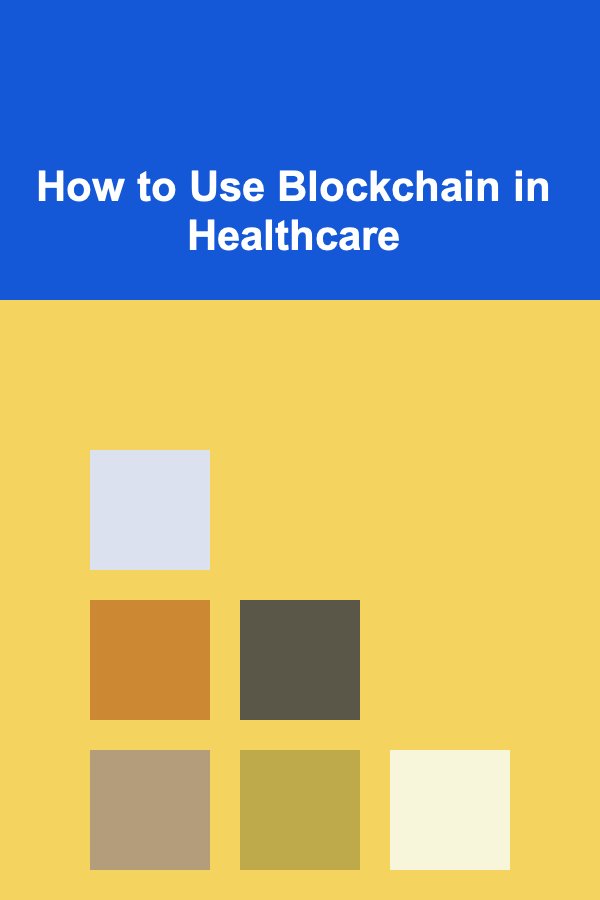
How to Use Blockchain in Healthcare
ebook include PDF & Audio bundle (Micro Guide)
$12.99$11.99
Limited Time Offer! Order within the next:

Blockchain technology, initially known as the backbone of cryptocurrency like Bitcoin, has evolved far beyond its original purpose. In recent years, the potential of blockchain has garnered attention in various sectors, and healthcare is one of the most promising industries where its capabilities could be revolutionary. Blockchain can solve many of the persistent challenges in healthcare, including security, privacy, interoperability, data sharing, and transparency.
Understanding Blockchain Technology
At its core, blockchain is a decentralized, distributed ledger system where data is stored across multiple nodes in a network. Each block contains a record of transactions, and these blocks are linked together in a chain. Blockchain is often praised for its security because of its cryptographic methods, which ensure that once data is recorded, it cannot be tampered with without altering every subsequent block, which requires the consensus of the network. This makes it particularly useful in situations where data integrity is crucial, such as healthcare.
Blockchain is decentralized, meaning no single entity controls the data. This decentralization, combined with transparency and immutability, makes blockchain a highly secure technology. When it comes to healthcare, these features can have profound implications in a variety of areas, from patient records to drug traceability.
Key Benefits of Blockchain in Healthcare
1. Data Security and Privacy
The primary concern in healthcare data management is privacy. Health records are highly sensitive, and breaches can lead to identity theft, financial fraud, or worse. Blockchain provides a secure way to store patient data. Since blockchain uses cryptographic algorithms, each record or piece of data can only be accessed by authorized individuals.
Moreover, blockchain ensures that the data stored on it is immutable, meaning it cannot be altered or deleted. Any attempt to change the data requires the approval of the majority of the network participants. This feature makes blockchain an attractive solution for securing health records, preventing unauthorized access, and maintaining data integrity.
For patients, blockchain can empower them to control access to their own medical data. They can share their records with healthcare providers as needed, but they can also revoke access or grant it on a limited basis.
2. Interoperability
One of the most significant challenges in healthcare is the lack of interoperability between various healthcare systems. Different hospitals, insurance companies, and even governmental bodies often use incompatible systems, making it difficult to share patient data across the spectrum of care providers. Blockchain can bridge this gap.
Blockchain enables the creation of a unified, decentralized data structure where patient records can be stored and updated by multiple healthcare providers without requiring them to directly connect their systems. Through blockchain, a patient's health records can follow them seamlessly across the entire healthcare ecosystem, from general practitioners to specialists, labs, and pharmacies. This interoperability can lead to more efficient care and better patient outcomes.
3. Supply Chain Transparency
The healthcare supply chain is complex, involving manufacturers, distributors, pharmacies, and healthcare providers. Ensuring that drugs and medical supplies are genuine, safe, and traceable is a critical concern. Blockchain can bring unprecedented transparency to the healthcare supply chain.
By recording each step of a product's journey on a blockchain, from manufacturing to distribution, healthcare providers can track the authenticity and quality of drugs and medical devices. If a product is recalled or flagged as counterfeit, blockchain technology can quickly identify the point of origin, reducing the time it takes to recall affected products. This level of transparency could drastically reduce the risks associated with counterfeit drugs, improving patient safety.
4. Claims and Billing Management
Fraud in healthcare billing is a pervasive problem, costing billions of dollars annually. With blockchain's immutable record-keeping, the process of verifying claims becomes more transparent and secure. Each transaction or claim can be logged in a blockchain, where its authenticity can be verified, reducing the chances of fraudulent billing.
Additionally, blockchain can streamline the administrative aspects of healthcare billing, ensuring that patients, providers, and insurance companies are all on the same page. Blockchain can also automate the approval process for claims using smart contracts, reducing paperwork, delays, and the chance for human error.
5. Smart Contracts for Medical Services
Smart contracts are self-executing contracts where the terms of the agreement are directly written into code. In healthcare, smart contracts could be used to automate and enforce agreements between parties, such as between healthcare providers and insurance companies.
For example, a smart contract could be used to ensure that a patient's treatment is covered by insurance and that payment is automatically processed once the treatment is delivered. These contracts are transparent, secure, and eliminate the need for intermediaries, reducing administrative costs and potential disputes.
Practical Applications of Blockchain in Healthcare
1. Electronic Health Records (EHRs)
Blockchain can solve the problem of fragmented and inaccessible electronic health records. Current systems often suffer from incompatibility and lack of patient ownership. Blockchain can store a patient's entire health history in a secure, decentralized, and immutable ledger, accessible by both the patient and authorized healthcare providers. This system would reduce the risk of errors caused by incomplete or outdated records and streamline care.
Patients can control their data and decide who has access to it, ensuring that only those with permission can view sensitive health information. Blockchain also helps track updates to the health record, ensuring that all changes are properly documented and traceable.
2. Clinical Trials and Research
Blockchain technology can improve the transparency and reliability of clinical trials and medical research. The research process is often plagued with issues like data manipulation, fraud, and lack of transparency. By recording each step of the research process on a blockchain, all data related to a clinical trial can be made publicly available, ensuring that researchers, regulators, and the public can trust the results.
Additionally, blockchain can help researchers access a secure, shared database of anonymized patient information to find suitable candidates for trials. This can speed up recruitment and ensure that trials are conducted with valid data, leading to more accurate results and faster advancements in medical treatments.
3. Medical Device Tracking
Medical devices are subject to rigorous regulations, and ensuring their safety and effectiveness is critical. Blockchain can be used to track the production and usage of medical devices. Each device can be assigned a unique identifier that is recorded on a blockchain. This allows manufacturers, distributors, and healthcare providers to track the device's journey from production to patient use.
Blockchain can also help monitor the maintenance and servicing of medical equipment. If a device malfunctions or causes harm, blockchain records can trace its origin and usage history, providing valuable information for investigating incidents and improving patient safety.
4. Pharmaceutical Industry and Drug Traceability
Pharmaceutical companies can use blockchain to track drugs through every stage of the supply chain. From production to delivery to pharmacies, each step can be recorded and validated on a blockchain. This ensures the authenticity of the drugs, preventing counterfeit drugs from entering the market and safeguarding patients from harm.
In the event of a product recall, blockchain can quickly trace the affected batch back to its source, helping to identify and remove dangerous products more efficiently.
5. Insurance and Payment Systems
Blockchain can significantly enhance the efficiency of healthcare insurance and payment systems. By using blockchain to store patient data, insurance companies can more easily verify claims and process payments. Blockchain also reduces fraud by ensuring that every transaction is transparent and immutable.
Smart contracts can also be employed in insurance claims processing. A smart contract could automatically release payment when certain conditions are met, such as when a patient receives treatment or when the insurance provider verifies that the treatment was covered under the patient's policy.
Challenges and Barriers to Blockchain Adoption in Healthcare
While blockchain has enormous potential, there are several barriers to its adoption in healthcare:
1. Regulatory Hurdles
Healthcare is a highly regulated industry, and blockchain technology is still relatively new. Current healthcare regulations may not account for the decentralized nature of blockchain, and adapting these regulations to accommodate blockchain could take time. Additionally, healthcare providers and insurers are wary of adopting a new technology that may not be fully aligned with existing laws and standards.
2. Data Privacy Concerns
While blockchain offers enhanced security and privacy, the permanent nature of blockchain could raise concerns regarding patient privacy. For example, healthcare data that is stored on a blockchain may be difficult to erase or modify, which could conflict with regulations such as the General Data Protection Regulation (GDPR), which grants individuals the right to have their personal data erased.
3. Scalability
Blockchain networks can sometimes struggle with scalability. As the number of transactions increases, the blockchain can become slower and more cumbersome. Healthcare systems require high throughput and the ability to handle large amounts of data efficiently, which may be challenging for current blockchain technology.
4. Cost and Infrastructure Requirements
Implementing blockchain in healthcare systems requires substantial investment in new infrastructure, including the technology to support decentralized ledgers and the integration of blockchain with existing systems. Healthcare providers, particularly smaller organizations, may find it challenging to absorb these costs.
5. Stakeholder Resistance
Healthcare organizations, insurance companies, and even patients may be resistant to adopting new technologies. The healthcare industry is traditionally slow to embrace change, and many stakeholders may be reluctant to switch to a blockchain-based system due to concerns about costs, training, and the potential disruption of existing processes.
Conclusion
Blockchain has the potential to revolutionize the healthcare industry, offering solutions to many of its most pressing challenges, including data security, interoperability, supply chain transparency, and fraud prevention. By creating a decentralized, secure, and transparent way to store and share data, blockchain can improve the efficiency and effectiveness of healthcare systems worldwide.
However, the adoption of blockchain in healthcare is not without challenges. Regulatory hurdles, privacy concerns, and the scalability of blockchain networks must be addressed before widespread implementation can occur. Despite these challenges, the future of blockchain in healthcare looks promising, with numerous pilot projects and initiatives already underway. As technology evolves and healthcare organizations continue to embrace innovation, blockchain has the potential to become a foundational element of the healthcare system, improving patient outcomes and enhancing the overall healthcare experience.

How To Choose Wine Based on Your Mood
Read More
How To Connect with Your Body's Wisdom
Read More
How to Create a Checklist for Reviewing Your Past Goals During Performance Evaluations
Read More
How to Increase Home Rental Property Profitability Through Tax Deductions
Read More
How to Make a DIY Tool Organizer from PVC Pipes
Read More
How to Choose the Right IoT Platform as an Architect
Read MoreOther Products

How To Choose Wine Based on Your Mood
Read More
How To Connect with Your Body's Wisdom
Read More
How to Create a Checklist for Reviewing Your Past Goals During Performance Evaluations
Read More
How to Increase Home Rental Property Profitability Through Tax Deductions
Read More
How to Make a DIY Tool Organizer from PVC Pipes
Read More